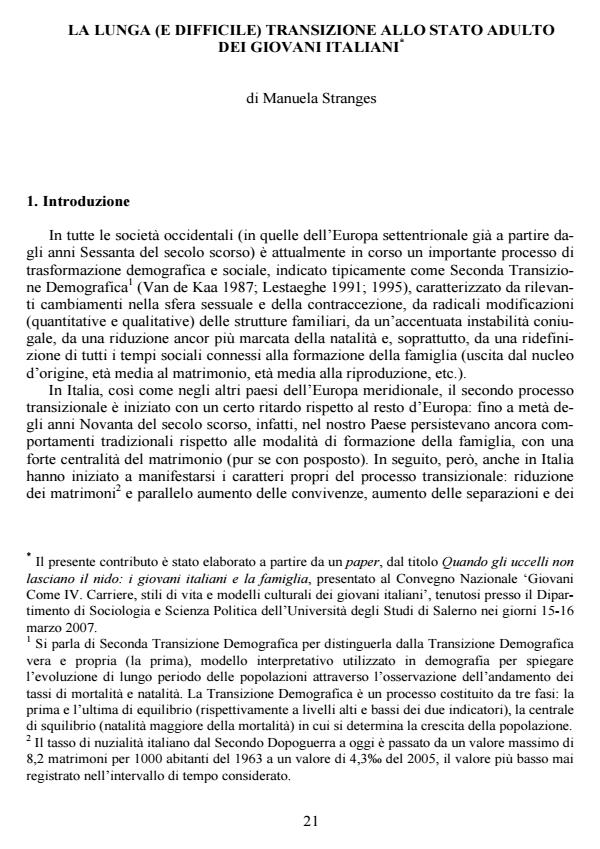La lunga (e difficile) transizione allo stato adulto dei giovani italiani
Journal title SOCIOLOGIA E POLITICHE SOCIALI
Author/s Manuela Stranges
Publishing Year 2007 Issue 2007/2
Language Italian Pages 14 P. 21-34 File size 68 KB
DOI
DOI is like a bar code for intellectual property: to have more infomation
click here
Below, you can see the article first page
If you want to buy this article in PDF format, you can do it, following the instructions to buy download credits

FrancoAngeli is member of Publishers International Linking Association, Inc (PILA), a not-for-profit association which run the CrossRef service enabling links to and from online scholarly content.
The long (and hard) way to adulthood of the Italian youth ABSTRACT: All the western societies are currently facing an important process of demographic and social transformation, typically indicated as Second Demographic Transition. This process is characterized from important changes in the sexual and contraception spheres, from radical modifications (both quantitative and qualitative) of the family structures, from an emphasized marriages instability, from a marked reduction of the birth rate and, above all, from a redefinition of all the social times related to the formation of the family (average age of exit from the origin nucleus, average age at the wedding, average age at parenthood, etc.). Among the other European countries, Italy maintains some peculiar characters, especially about the great value still recognized to the family and the wedding and the persistence of a strong tie between parents and sons, confirmed by the intergenerational solidarity system which is still very important in the Country and from the living choices done from the young leavers (for instance, the housing proximity) that confirm their will to maintain tight relationships with the family of origin. A deep change in the events’ calendar which define times and ways of entrance, permanence and exit from the various stages of the life cycle is going on in Italy, especially with regard to transition to adulthood, which appears to be more and more postponed and also characterized from remarkable changes in the motivation of the exit from the origin family and in the subsequent family and reproductive intentions of young Italians. In the present contribution we will attempt to analyze characters, times and ways of the long (and difficult) transition to the adult state of the Italian young people, using the informative base represented from the Istat Multipurpose Surveys. For such a purpose there’ll be analyzed, in particular, the motivations of the long permanence and those of exit from the origin nucleus and the young people opinions about some aspects regarding the family.
Manuela Stranges, La lunga (e difficile) transizione allo stato adulto dei giovani italiani in "SOCIOLOGIA E POLITICHE SOCIALI" 2/2007, pp 21-34, DOI: